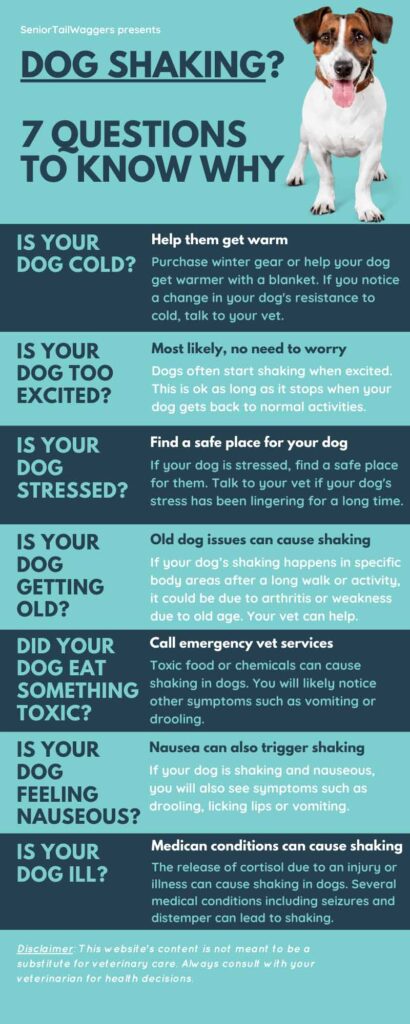
This article was updated on March 27th, 2022
Anytime your dog is shaking it can make your mind jump to the worst. After all, shaking in dogs can be caused by a number of things, some that may be a big deal. It may help to know that shaking in dogs doesn’t always mean something bad, so let’s dive deep into why a dog may be shaking, when to worry about it and what can be done.
How to Tell If Your Dog’s Shaking is Serious
You’ll know that your dog’s shaking needs immediate veterinary attention if they are showing any other signs, including:
If you think your dog is shaking because of stress or anxiety, you should also consult your veterinarian, especially if is a long-term issue. Read our article on Senior Dog Anxiety: What Causes It, and What You Can Do to Help.
As mentioned earlier, if you notice a sharp change in your dog’s tolerance for cold, you should also talk about it with your vet. This could be the sign of a more serious medical issue.
7 Simple Questions to Find Out Why Your Dog is Shaking

Now that you’re sure that your dog is shaking, let’s look at why that may be. Again, there are many reasons why a dog might shake, some more serious than others.
If Your Dog Is Shaking But Everything Else Appears Normal:
1. Is your dog cold?
Your dog might be simply shaking because they feel cold. This is particularly true for breeds that don’t do well in cold weather. Breeds such as French bulldogs, greyhounds and chihuahuas are ill-equipped for cold climates due to their short coats and little body fat. Most short-hair dog breeds will feel more comfortable with temperatures above 15°C (59°F) (Source: Temperature Requirements for Dogs or our article how cold is too cold for your dog?. You may also want to consult your vet if your dog’s tolerance to cold has changed. Maybe they used to be a lover of the snow and ice but now shake and don’t want to leave the proximity of the heater. These changes could indicate a health concern.
2. Is your dog too excited?
Excitement could be the simple reason behind your dog’s shaking. This could be true if your dog is shaking when you get back home or when you are about to play a fun little game. You don’t need to worry if this is the case, as this type of shaking is ok as long as it stops when your dog gets back to normal activities.
3. Is your dog stressed?
Stress or anxiety can cause your dog to start shaking because they trigger the release of hormones, such as cortisol. These hormones can lead to muscle shaking as well as extra activity that could include jumping, hiding or becoming more aggressive.
If you think your dog may be experiencing anxiety or stress, try to identify the source of the problem: it may be new guests in your house, new activity right outside of your home, or more obvious reasons such as fireworks or thunder.
If your dog is stressed, find a safe place for them. However, if your dog experiences chronic anxiety, more advanced behavioral therapy or medication may be required. It’s best to get a dog’s stress or anxiety under control as long-term effects can lead to a decreased immune system and behavioral changes.
4. Is your dog a senior?
As many as 60% of dogs will end up experiencing arthritis, a condition common with senior dogs. As they age, dogs also tend to become weaker. If you notice that your dog’s shaking tends to happen in specific areas of their bodies after a long walk or play activity, it could be the sign that your senior dog’s shaking is due to arthritis or general weakness due to older age. You should consult with your veterinarian as physical therapy and anti-inflammatories may help this type of shaking.
If your dog is shaking, and also showing signs of illness such as vomiting or drooling, consider the following:
5. Did your dog just eat something toxic?
Toxic food or chemicals can sometimes cause shaking in dogs. If this is the case, you will likely notice other symptoms such as vomiting or excessive drooling. Food such as chocolate, grapes, raisins or onions, or xylitol (a common ingredient in medications) can be very toxic to dogs. If you notice symptoms of poisoning, call your veterianarian emergency contact immediately and call the ASPCA Animal Poison Control Center at (888)-426-4435.
6. Is your dog feeling nauseous?
Your dog may feel nauseous simply because of an upset stomach. It could also be a sign of a more serious condition such as kidney disease. If your dog is shaking and nauseous, you will also see symptoms such as drooling, licking lips or vomiting.
7. Is your dog suffering from a medical condition?
The release of cortisol related to an injury or illness can be why a dog is shaking. Several medical conditions including the following can result in dog shaking:
Distemper: Distemper is a lethal condition that attacks your dog’s respiratory and nervous system, resulting in continual shaking, as well as other clinical signs including fever, lethargy and a runny nose/eyes. Dogs can and should be vaccinated every three years against distemper.
Seizure: epilepsy can cause seizures that will look similar to shaking. If your dog does not appear aware of their environment, shaking could be the sign that they are having a seizure. A seizure is an abnormal electrical activity in the brain that can lead to shaking and a sudden change in your dog’s behavior. Contact your veterinarian to prevent future seizures and issues.
How to Help a Dog That is Shaking
The first step in helping a dog that is shaking is to find out why.
- If they’re cold, warm them up.
- If they’re scared or anxious, comfort them and try to make the inciting cause go away. If you know what your dog is scared of, try to prevent future episodes. For example, if a storm is forecast, make your dog a comfortable bed in a quiet room well in advance or look into calming aids like ThunderShirts or pheromones.
- If they are scared of guests or sudden changes in their environment, consider placing them in a quieter room.
ThunderEase Dog Calming Pheromone on Amazon:
- If you think your dog is sick or ate something poisonous, contact your vet. For older dogs that are shaking from the discomfort of arthritis, speak to your vet about anti-inflammatories and joint supplements that can reduce joint pain.

How Can My Veterinarian Help?
Your veterinarian is going to start with a thorough exam when your dog is shaking. They will check for health conditions that could be behind it, such as arthritis, injuries, and digestive issues. They may also perform blood work if they suspect organ or metabolic disfunctions, like hypothyroidism.
Your vet will also discuss with you causes of stress, anxiety, or fear and ways that you can reduce those causes and whether or not medication may be necessary.
How Will a Vet Visit Cost Me If My Dog is Shaking?
Look to spend anywhere from $100-$1,000 to work up a dog that is shaking. This cost varies depending on the cause and treatment plan.
Conclusion
Dogs may shake from causes as far ranging as they’re overly happy to see you to the ingestion of a poison. While any shaking in dogs can be scary, do your best to find out why your dog is shaking and speak with your veterinarian if you’re at all concerned.
What is Shaking in Dogs?
Before we get into the where’s and whys of shaking in dogs, let’s first pinpoint what shaking looks like. When a dog is shaking it can look similar to other types of movements, including twitching, itching, or seizing.
First of all, shaking tends to be a whole-body movement. All parts of the dog’s body will show movement and dogs are completely awake and aware of their surroundings.
If we compare that to muscle tremors or twitches, these tend to occur in specific areas rather than the whole body.
Seizures are whole-body movements but the seizing dog isn’t aware of their surroundings.
Frequently Asked Questions About Dogs Shaking
What if my dog is shaking and panting at the same time? Shaking and panting may both be caused by excitement, discomfort, or anxiety/stress. It can be hard to tell the difference between these causes, so look at what else is going on around you. Did you just get home? Was there a loud noise outside? Are they favoring a leg or unwilling to move? Does this happen frequently after certain events? Paying attention to what else is going on at the time that your dog is shaking and panting will help you narrow down the causes.
What if my dog is shaking and drooling or foaming at the mouth? This could mean that your dog ate something potentially poisonous or they are nauseous. If you are seeing any other signs, such as fevers, vomiting, or not eating, contact your veterinarian. Some dogs may also shake and drool if they are car sick or even with extreme anxiety.
What if my dog is shaking and vomiting? Shaking and vomiting can indicate a poison or illness. Contact your veterinarian, especially if this came on suddenly. They may also be showing signs of abdominal pain, fevers, or not eating.
Also read our article about a dog shaking his head.
Disclaimer: This website's content is not a substitute for veterinary care. Always consult with your veterinarian for healthcare decisions. Read More.



Be the first to comment